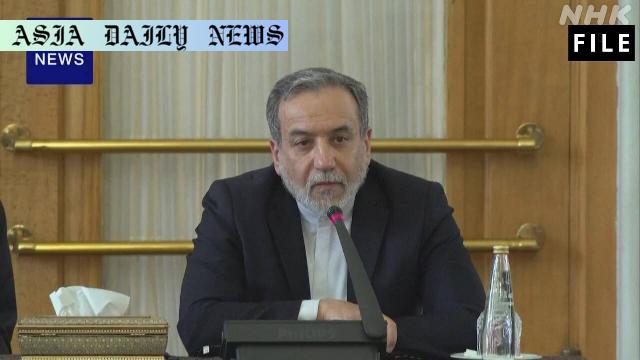Iran nuclear talks: Tehran open to indirect negotiations with the US backed by confidence-building measures.
- Iran’s Foreign Minister Abbas Araghchi reveals openness to indirect US talks.
- Tehran highlights confidence-building measures for nuclear program transparency.
- Negotiation strategies include sanctions relief and indirect diplomacy.

Background on Iran’s Nuclear Program and its Challenges
For decades, Iran’s nuclear program has been at the center of global geopolitics. While Tehran asserts its program is for peaceful energy purposes, many countries, particularly the United States and its allies, remain wary of the potential for nuclear weapons development. The 2015 Joint Comprehensive Plan of Action (JCPOA), commonly known as the Iran Nuclear Deal, was a historic agreement hailed as a step towards resolving this contentious issue. However, the deal has faced significant challenges, especially following the US’s 2018 withdrawal under the Trump administration.
As sanctions were reinstated on Iran, the country’s economy tightened, and its nuclear activities, including uranium enrichment, escalated. Under President Biden, there has been a renewed attempt to engage Iran diplomatically. Yet, mistrust on both sides has stalled progress, and recent attacks on Iran’s nuclear facilities have further strained relations. Against this backdrop, Iranian Foreign Minister Abbas Araghchi’s announcement of openness to indirect talks with the US is a notable development.
Tehran’s Position on Indirect Negotiations
Iran’s stance on indirect negotiations with the US marks a pragmatic approach to reestablishing dialogue. While direct talks may seem implausible given decades of animosity, indirect negotiations mediated by other countries provide a viable alternative. This strategy reflects cautious optimism, balancing Iran’s interests while addressing the demands of the international community.
Araghchi emphasized that Iran is willing to adopt confidence-building measures to demonstrate the peaceful intent of its nuclear program. Such initiatives may include increased transparency in nuclear activities and cooperation with international watchdogs like the International Atomic Energy Agency (IAEA). However, Tehran expects reciprocal actions, particularly the lifting of harsh US-imposed sanctions that have crippled its economy. Araghchi described this exchange as a ‘win-win game,’ signaling that Iran views sanctions relief as a priority in any forthcoming agreement.
The Role of International Diplomacy
With talks scheduled with Britain, France, and Germany, Iran’s engagement with European nations highlights its commitment to reaching a resolution. Europe has played a pivotal role in keeping the JCPOA alive despite its challenges, and continued collaboration is necessary for achieving diplomatic breakthroughs. The shifting dynamics of the Middle East, including tensions with Israel and regional power struggles, add layers of complexity to these discussions.
Furthermore, the role of Russia and China, both of which are signatories of the JCPOA and maintain trade relations with Iran, cannot be understated. Collective international effort is essential for delivering equitable solutions that address regional security concerns and mitigate proliferation risks.
What’s Next for US-Iran Relations?
The path forward in US-Iran relations hinges on trust-building and strategic compromises from both nations. Araghchi’s indication that Iran prioritizes national pride in its nuclear program demonstrates the symbolic value of this issue domestically for Iran. On the other hand, the US must navigate political challenges at home, given domestic opposition to appeasement strategies towards Tehran.
Ultimately, sustained diplomatic efforts, patience, and mutual sacrifices are required to bring the two nations closer to an agreement. With direct talks ruled out for the time being, indirect channels hold the promise of restarting dialogue and paving the way for more substantive negotiations in the future.



Commentary
The Significance of Indirect Negotiations
The announcement by Iran’s foreign minister regarding openness to indirect talks with the United States represents a cautiously optimistic step in international relations. This willingness is a calculated move by Tehran to demonstrate flexibility, despite underlying mistrust between the two nations. For Iran, emphasizing national pride in its nuclear program serves the dual purpose of addressing domestic pressures while maintaining leverage in negotiations.
The Complexity of Sanctions and Trust-Building
One of the most contentious elements in this story is the issue of sanctions relief. Iran has long considered economic sanctions as unjust and detrimental to its populace. By linking sanctions relief with confidence-building measures, Iran appears to be signaling its readiness to compromise. However, achieving this balance will not be easy, as the US will want to ensure that lifting sanctions leads to verifiable outcomes before taking any steps forward.
Broader Implications for the Region
This development also has significant ramifications for the broader Middle East. Countries like Israel continue to view Iran’s nuclear ambitions as an existential threat, which could lead to further unrest in the region. Establishing peaceful relations between the US and Iran could potentially shift dynamics in the Middle East, offering opportunities for collaborative security arrangements and reduced hostilities.
In conclusion, while challenges persist, this opening for indirect negotiations represents a renewed opportunity for diplomacy. Both nations and their allies must navigate these discussions with prudence, patience, and a firm commitment to peaceful resolutions. The stakes are high, but so are the potential rewards if successful compromises are achieved.